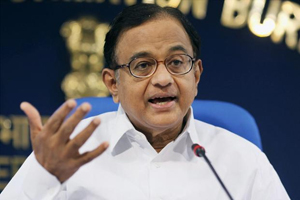 New Delhi, Nov 6: Finance Minister P Chidambaram has warned that Gujarat Chief Ministerial and Bharatiya Janata Party Prime Ministerial candidate Nadrendra Modi is propagating dangerous RSS ideology. In an interview with Network18, Chidambaram claimed the BJP is making the mistake of making Narendra Modi larger than the party.
New Delhi, Nov 6: Finance Minister P Chidambaram has warned that Gujarat Chief Ministerial and Bharatiya Janata Party Prime Ministerial candidate Nadrendra Modi is propagating dangerous RSS ideology. In an interview with Network18, Chidambaram claimed the BJP is making the mistake of making Narendra Modi larger than the party.
"The BJP has projected a person larger than the party, they'll realise this in the near future. It's a grave mistake. You can't project a person larger than party in a Parliamentary democracy. The RSS is fully behind this projection. So what is being propagated by Mr Modi today is not BJP's ideology but it is the ideology of the RSS. He is the chosen one of the RSS," Chidambaram said.
When asked whether the Congress has lost the plot, Chidambaram said, "This party has a long history of serving the people. We may have made mistakes but who hasn't made mistakes. Over 100 years, this party has made mistakes. Even during freedom struggle mistakes were made, but they were corrected. I don't think you can wish away Congress in near future."
Earlier on Monday, Jammu and Kashmir Chief Minister Omar Abdullah had admitted that the influence of Modi cannot be ignored. He, however, said that the term 'Modi wave' is an exaggeration. "As far as Modi wave is concerned, it is a bit of an exaggeration also. It would be wrong on our part to deny any influence of Modi in the election, but I wouldn't go as far as saying there is a wave," Omar said.
Narendra Modi is the most preferred choice for the post of Prime Minister in the four Assembly election-bound states - Madhya Pradesh, Chhattisgarh, Delhi and Rajasthan. A total of 35 per cent voters want him as the PM as against 17 per cent support for Congress Vive President Rahul Gandhi as the next prime minister.
When a CNN-IBN, The Week and CSDS survey in Madhya Pradesh, Chhattisgarh, Delhi and Rajasthan asked an open ended question without giving choices Narendra Modi came first. Rahul Gandhi came second followed by his mother and the Congress President Sonia Gandhi with 5 per cent popular support.
The incumbent Prime Minister Manmohan Singh equaled Sonia Gandhi with the same 5 per cent support. While the BSP supremo Mayawati got 2 per cent votes, the BJP patriarch LK Advani, who reluctantly forfeited his claim in favour of Modi, got just 1 per cent support.
The survey was conducted in only four Assembly elections bound states of Delhi, Rajasthan, Madhya Pradesh and Chhattisgarh. The fifth poll bound state of Mizoram was not included in the survey. Modi is way ahead of Rahul Gandhi in Delhi and Rajasthan, but the gap narrows in Madhya Pradesh and Chhattisgarh. In the national capital of Delhi, Modi has got 42 per cent support as against Rahul Gandhi's 15 per cent. In Rajasthan, Modi has got 40 per cent of the support as against Rahul Gandhi's 19 per cent.
When compared to CNN-IBN's July tracker, Modi's popularity has gone up in all four states. He was not named by the BJP as its PM nominee in July but he was the most preferred choice of 26 per cent in July. Rahul Gandhi's popularity has also seen a marginal increase of 2 per cent between July and October - 2013. In July, our sample size was also smaller in all four states.





Comments
Add new comment